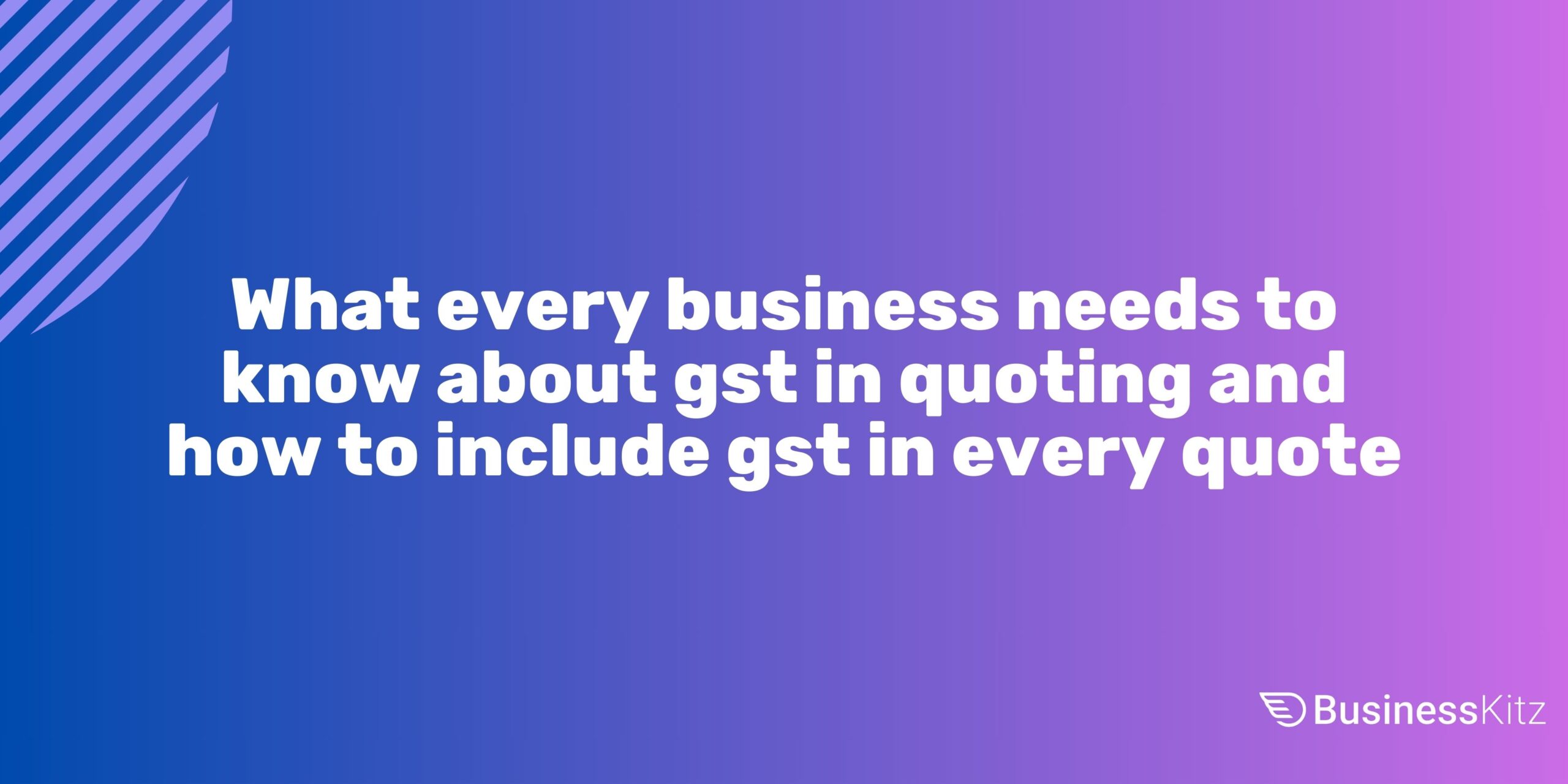
We've helped businesses save $55m with our all-in-one platform. Get instant access to this template and 115+ others, plus AI-powered document creation, starting completely free.
Clear quotes build trust and reduce confusion. If you don’t handle GST correctly in your quotes, you risk disputes and lost clients. Understanding gst in quoting is vital for any Australian business that provides goods or services. This guide explains who must include GST, how to quote it clearly and why getting it right matters.[ez-toc]
GST in quoting means showing whether GST is included in the price of a product or service. If your business is registered for GST, you must show this clearly in your quote. Use a total price and give a clear breakdown including the subtotal amount excluding GST and the GST amount to give the total price. This keeps your quote legal, avoids confusion and builds client trust.
When you provide a quote to a client, you are giving more than a price. To get it right, its important to understand GST in quoting. A quote is a formal promise that sets clear expectations about what a good or service will cost. If your quote is not clear about GST, it can confuse customers, create legal risk and hurt your reputation.
When GST-registered businesses include GST in the price and clearly show how it is calculated, this helps clients understand what they are paying. This is true whether you're a sole trader, partnership or Pty Ltd ABN registered company.Clear GST quotes help:
When clients see GST handled well in your quotes, they’re more likely to view your business as professional and reliable. It is important to note that only businesses and sole traders that are registered for GST are legally permitted to charge GST. If your business is not registered for GST, you are not allowed to charge GST.
If you as a business or sole trader registered or GST do not specify GST on a quote, or you quote prices without GST included, you may mislead consumers. This can breach the law.Here’s what can happen:
The Australian Taxation Office (ATO) requires businesses to make it clear when GST applies. Even if a company is quoting towards businesses, there must be a clear and unmistakable notice that GST would apply if the business providing the quote is GST registered.Whether you’re quoting a one-off job or regular service, quote templates made exclusively for Australian businesses can help you stay on track. Get started with Business Kitz Quotation Template today!

If your business earns over a certain amount each year, you may need to register for GST and include it in your quotes. Understanding GST in quoting and knowing when and how to charge GST is key to staying compliant and avoiding mistakes.
The Australian Taxation Office sets a GST turnover threshold of $75,000 per year for most businesses. If you reach or expect to reach this threshold, you must register for GST.You must register if you are:
Once you register, you must include GST in all your taxable quotes, invoices and account for GST in your business records.
If your business is registered, you are required to quote a GST-inclusive price unless the business-to-business exception applies. This means your quoted price should either:
The ACCC states that businesses are required to quote GST-inclusive prices for customers unless the quote is made exclusively to another business, in which case, businesses do not have to specify the exact amount of GST (e.g. "$135 plus GST").
A quote is made exclusively to offer a price before a job starts. An invoice comes after the job and confirms the amount due. The price includes GST in both if your business is registered. This keeps your transactions accurate and legal.
Business typeGST registeredNeed to include GST in the quote?Sole trader under $75kNoNoSole trader over $75kYesYesPartnership under $75kNoNoPty Ltd earning over $75kYesYesNon-profit under $150kNoNoRide-share or taxi serviceYes (always)YesIf you're unsure, always seek advice from the Australian Taxation Office or an Accountant to determine whether you're required to register or quote GST.
Every quote you send should be clear, accurate and easy to understand. If your business is registered for GST, your quotes must also meet Australian legal requirements. It is best practice to specify the exact amount of GST in quoting as a well-structured quote helps avoid confusion and shows your business in a professional light.
When you provide a quote, make sure it includes the following:
If your quote is for another business and you choose to quote prices without specifying the GST amount, you must also make it clear that GST is not included in the quoted price and that it will be added.
You can include GST in the price or show it as a separate amount. Either is allowed as long as the GST is easy to see and understand. Here are two common ways to do it:Pricing formatExampleWhen to useGST-inclusive (preferred)$1,100 (incl. GST)For most customers (B2C)Plus GST$1,000 + GST = $1,100Often used in B2B quotesIf your quote is made exclusively for business-to-business sales, you may use the “plus GST” format. This method must be exclusive to businesses and businesses must ensure there is reasonable notice given about the added GST amount.
Keep your layout simple and clean:
Make sure the price of goods or services is listed clearly. If you're listing a service as a single figure, confirm that the single figure includes tax. Business Kitz Quotation Template can help get you started. Sign up for a free Business Kitz account today!
How you present GST in your quotes matters. You must show prices clearly so clients understand what they will pay. Whether you’re selling to consumers or businesses, you need to choose the right pricing method.
There are two main ways to show GST in a quote. You can either include GST in the price or show it as an added amount.Each method has pros and cons:FormatExampleProsConsGST-inclusive$1,100 (incl. GST)Clear final price, no surprisesMay seem more expensive upfrontGST-exclusive$1,000 + $100 GST = $1,100Useful for B2B salesCan mislead if not clearly shownYou must give a clear and unmistakable notice when GST is not already included. If you quote a GST-inclusive price, label it clearly. If you quote prices without GST included, highlight that the additional 10% will apply.
Even if a company is quoting towards businesses, it must be clear that the price is not final until GST is added. Speak with an accountant if you are having trouble understanding GST in quoting.
Getting GST wrong in a quote can cause confusion or even break the law. Clients rely on your quote to understand the full cost of a good or service. If you fail to clearly state the GST, you may mislead consumers and breach Australian Consumer Law.
One of the most common mistakes is quoting a single figure with no mention of GST. If you are required to quote a GST-inclusive price, you must say so clearly. If you are a GST-registered business, a price with no GST label can leave clients thinking GST is already included when it’s not.This can lead to:
Businesses must ensure they do not quote prices without GST included unless they make it clear that GST will be added, or are a business which is not registered for GST and therefore not legally required to include GST in quotes or invoices.
Some businesses forget to update their quotes after they register for GST. If your corporate structure changes or your GST turnover grows, you must check your quote templates. Quotes that do not show GST after registration can result in incorrect pricing.
The ACCC requires businesses to show total price in a way that does not mislead. Even if a quote is for another business and is exclusive of GST, it must state that clearly specifying that GST applies in addition to the quoted price.
Keep your quotes legal and clear by avoiding these errors:
To stay safe, always check that your quote complies with Australian rules. Understanding GST in quoting is crucial for your business compliance.
Different industries face different GST quoting needs. Some clients expect prices without GST. Others want to see the total price upfront. Below are examples of common industries and how most people and businesses quote in each one.
Tradies often supply goods or services and quote a single figure inclusive of GST if they are GST-registered. Most tradies serve both businesses and the public, so clear pricing is essential.Common issues:
Solution: Use a written quote with:
Graphic designers, photographers and marketers often provide a quote for packages. They may not mention GST unless asked.Common issues:
Solution: Clearly show whether GST is included or added. Use templates that label tax amounts and avoid confusion.
Some services are exempt or GST-free, but not all. If you offer both types of services, your quote must make the difference clear.Solution: Break down your quote to show which parts include GST and which don’t.Whether your quote is made exclusively for a customer or another business, it must follow the law. Use this comprehensive guide to spot risks and fix them, or ask a tax professional if you are unsure about your legal responsibilities when issuing quotes or invoices.

Some businesses do not have to charge GST. This depends on your income, your business type and what you sell. If your business is exempt, your quote must still be clear to avoid confusion or claims of trying to mislead.
You may not need to charge GST if:
If you are not registered, you must not include GST in your quoted price.
Some goods and services are not taxed under GST law.
These sales do not include GST most of the time, and you cannot claim GST credits on costs linked to them. Speak with a tax professional if you are unsure.
You must make it clear when your prices do not include GST. This avoids confusion and makes the total price clear to your client.Use simple language in your quote:
Even if you’re exempt, your quote still needs to be accurate. Always label your prices so that clients know whether GST applies. Use tools like Business Kitz templates to keep your quotes consistent—no matter your business type.
When you provide a quote to another business, the rules are slightly different. B2B clients often prefer to see prices without GST included, as they can usually claim GST back later. But this does not mean you can leave GST out of your quote entirely.
Many businesses want to know the price of goods or services before tax. This helps them compare quotes and plan for GST refunds through their own records. In these cases, you can quote prices exclusive of GST and specify that GST is an additional cost, but only if the quote is made exclusively to a business client.
Even when using GST-exclusive pricing, you must show the full tax amount. The quote should include:
When quoting to another business, include:
This shows that your business is registered, professional and reliable. It also supports your position if there’s a transaction dispute later.
In long-term B2B relationships, good records matter. Use consistent formatting and store every quote and invoice. Business Kitz Document Vault makes this easy and helps you securely store all your business records and quotes. Check out Business Kitz features designed to support your established or growing business!

If you sell to everyday buyers, your quotes must be easy to understand. Unlike B2B clients, consumers do not usually claim back GST. They want to know the total price upfront, with no hidden fees or surprises.
The Australian Consumer Law (ACL) sets strict rules. If you sell to the public and are registered for GST, you are required to quote a GST-inclusive price. This means your quoted price must include any taxes or fees. If you leave GST off or hide it in fine print, you may mislead the buyer and face a breach of the law.The ACCC has made it clear—when selling to the public, businesses must include any taxes in the price shown. This applies to all quotes, ads and websites.
Your quote should:
When consumers see clear prices, they’re more likely to buy. A quote that shows one simple price with no hidden fees helps avoid disputes and builds trust in your brand.Whether you're a business owner or sole trader, clear quotes help protect your business and your clients.
The goods and services tax (GST) is a 10% tax added to most goods and services sold or consumed in Australia. If your business is registered for GST, you must clearly show GST in your quotes. You can either include it in the total or show it as an additional 10 percent. GST should also be included in invoices you issue later.
If your business is registered for GST, you usually need to include GST in your quotes. You can show a GST-inclusive total or add GST as a separate line. If your quote is made to a consumer, you must show the final total with GST. This helps ensure clients are not misled.
Only if the quote is made exclusively to a business and the pricing format is clear. In B2B cases, GST-exclusive prices are often accepted. But you must still state that GST will be added. The exception cannot be used when the product is for consumers. Quotes must still be clear about GST.
If you forget to show GST, your quote may be seen as misleading. This could lead to disputes, lost sales or legal action. The tax which applies must be clear upfront. If the price appears final, customers may assume it includes all costs. This applies to both one-off quotes and large contracts.
If you’re not registered, you must not charge GST. You must also not include GST in your quotes. Instead, note that your business is not registered for GST. This is especially important if you’re a potential supplier to supply goods or services to a larger company. Clear communication prevents confusion.
Yes. If you give a price in an advertisement, it must follow the same GST rules. You must either show the full price including GST or give clear notice that GST is extra. This helps the customer understand the full cost before making a decision.
Yes. If your annual income from business reaches the GST threshold, you must register and quote GST. Businesses are still required to follow GST rules even if they operate part-time. Once registered, you must add GST to every taxable quote.
No. Past quotes cannot be relied upon if your GST status changes. You must update your quote templates to match your current status. If your GST registration begins, you must add GST to all future quotes.
Quoting GST the right way helps you stay legal, minimise the risk of fines and build trust with clientele. Whether you're a sole trader, partnership or large company, you must be clear about the goods and services tax in every quote. Clients need to know if your quoted price includes GST and what they are paying for.If you quote the wrong way, you may mislead consumers or break rules set by the ACCC. Clear GST pricing isn’t just good practice—it’s a must.No matter your business size or industry, Business Kitz is here to help. Access over 100 document and agreement templates, securely store documentation, and manage your to-do list all in one location. Sign up today!Disclaimer: This content is intended to be used for educational and informational purposes only. Business Kitz does not offer legal advice and cannot guarantee the accuracy, reliability, or suitability of its website content for a particular purpose. We encourage you to seek professional advice from a licensed professional and verify statements before relying on them. We are not responsible for any legal actions or decisions made based on the information provided on our website.Unless expressly stated otherwise, all content, materials, text, images, videos and other media on this website and its contents are the property of their respective copyright owners.
Copyright © 2025 Business Kitz 14312161